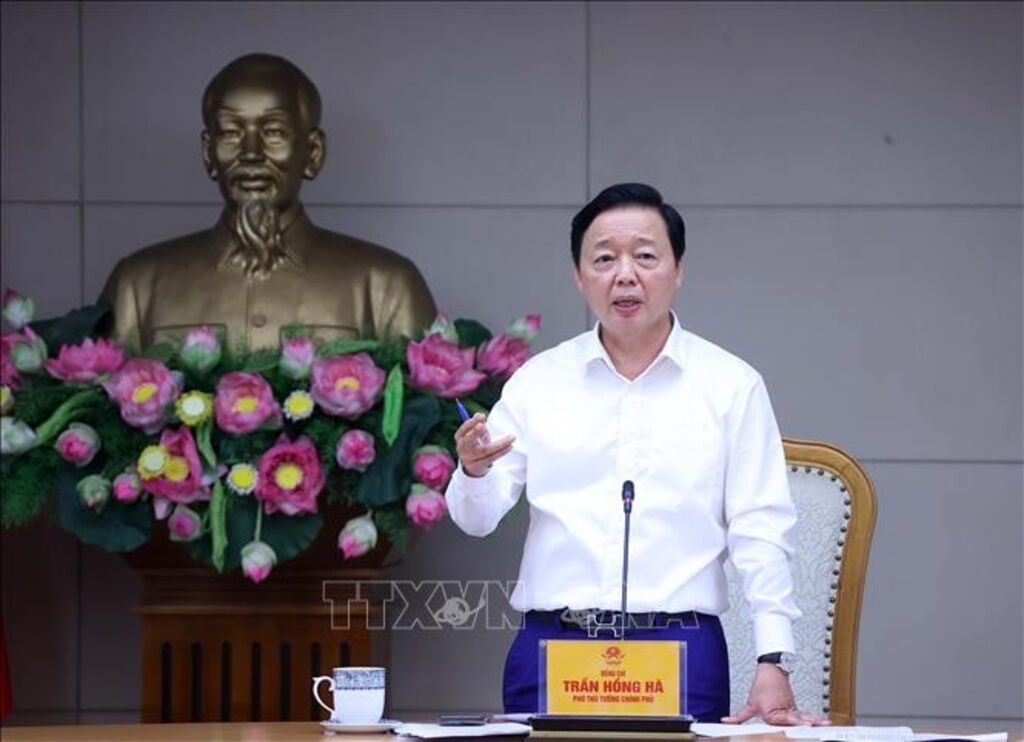 |
| Deputy Prime Minister Tran Hong Ha chairs a meeting of the National Steering Committee for Illegal, Unreported and Unregulated Fishing Prevention and Control in Hanoi on August 1, 2025__Photo: VNA |
Deputy Prime Minister Tran Hong Ha chaired a meeting of the National Steering Committee for Illegal, Unreported and Unregulated (IUU) Fishing Prevention and Control in Hanoi on August 1, calling for a fundamental shift in mindset and approach to effectively address the root causes of IUU violations.
Speaking at the meeting, Ha emphasized that Vietnam must go beyond meeting the European Union (EU)'s requirements, and focus on unlocking the potential of the fisheries sector, safeguarding marine resources, and ensuring sustainable livelihoods of fishermen. The long-term goal is to maintain export momentum and uphold Vietnam’s reputation on the global seafood market, he stressed.
He urged a comprehensive review and completion of legal documents, particularly decrees related to offshore fishing support policies and administrative sanctions. A clear mandate was given to set measurable goals, such as eliminating violations in foreign waters, establishing a robust vessel monitoring system (VMS), and ensuring transparency and accountability in every step across ministries, sectors, and localities.
The Deputy PM highlighted digital transformation as a pillar of monitoring and traceability, calling for the integration of various data sources, including the VMS, electronic logbooks, population databases, port controls, satellite data, and AIS signals, into a unified, interactive platform. He also proposed leveraging artificial intelligence and blockchain to enhance data security, tracking, and early warning capabilities.
The meeting also discussed partnerships with international organizations such as Global Fishing Watch, WWF, the EU, and the US to exchange experiences and access advanced technological solutions.
The Ministry of National Defense was tasked with coordinating maritime surveillance with national security duties, with the coast guard, border guard and fisheries surveillance forces required to work closely with local authorities under a unified command system.
Ha also urged local administrations to devise concrete transition plans for fishermen, ensuring social welfare and alternative livelihoods. The central government stands ready to support these efforts through policy and budgetary mechanisms, he noted.
Deputy Minister of Agriculture and Environment Phung Duc Tien reported that, as of June 30, a total of 81,719 fishing vessels had been registered in the national VNFishbase system. Among them, 99.06% of boats that are 15m in length or longer were equipped with VMS devices.
Weekly updates on high-risk vessels are compiled based on VMS data to assist law enforcement forces. The ministry also provides daily alerts for boats operating near maritime boundaries or losing VMS connection, enabling timely warnings to prevent border violations.
The number of VMS-related violations has declined year-on-year. As of June 30, only 3,098 cases of vessels losing VMS connection for more than six hours were reported, a reduction of 5,833 cases. Incidents of vessels crossing into foreign waters fell to just four, involving four boats.
The electronic catch documentation and traceability (eCDT) system is now in place at 94 fish landing points, an increase of 32 compared to mid-2024. However, several localities have still faced challenges in funding, staffing, and infrastructure needed for effective port inspections and vessel patrols.
The Ministry of Agriculture and Environment is intensifying efforts to strictly punish IUU violations. Nonetheless, several provinces have yet to fully update IUU sanction data in the national administrative penalty system.
Director of the Department of Fisheries and Fisheries Resources Surveillance Tran Dinh Luan stated that core databases such as VMS and VNFishbase are now interconnected and shared with multiple agencies, including police, coast guards, border guards, and central/local fisheries surveillance units. Inspections of vessel logs and routes can now be completed in 5–10 minutes per boat.
Local representatives called for more effective monitoring, stricter penalties for deliberate VMS tampering, and prosecution of serious IUU cases to strengthen deterrence. They also proposed integrating software platforms and developing automated alert systems to enhance coordination among enforcement bodies.- (VNA/VLLF)









